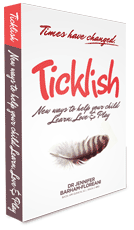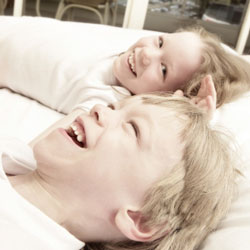So many mothers express frustration over children…
- Who aren’t exercising enough
- Wont read books
- May be over weight but undernourished because they self-limit their diet
- Are stressed or unhappy
The good news is there is so much that we can do to protect our child’s health and nurture their minds and bodies.
“I can’t do everything, but I can do little things each day.”
This is so true and it is just one of the valid points that Lara, a busy mother of three, makes in this video and her review of “Ticklish — New Ways to Help Your Child Learn, Love & Play”…
For most of us ‘life’ is crazy busy and todays parents are pushed — physically, emotionally and financially. Many of us are sleep deprived and feel stressed trying to juggle the demands of little people with everyday “to do items” related to work and home. Stress depletes our sense of humour, our sex lives, our health and we may choose to let these aspects of our lives slide hoping that they’ll fall into place as the chaos eases.
When we feel overwhelmed by tasks nothing makes us feel better then taking some kind of action and that was my intention when writing Ticklish. I wanted to offer parents simple ideas they could undertake each week that will build their child’s well-being, an easy to read book that explores many simple, proven, research-based ideas to help our child THRIVE in today’s challenging environment. A light-hearted, fun book that allows us to support our children to express their full potential.
Ticklish is written all parents who have children of varied ages and here are just some of the topics:
- How to help our newborn baby developmentally
- What does an uneven head shape mean?
- Why is tummy time important?
- What causes a body to be out of balance?
- Knowing what increases our “feel good” chemicals and what decreases our “out of sorts” chemicals
- Developmental charts to help measure our child’s milestones and what activities we can undertake with our child.
- How to strengthen our child’s health
- Brain Foods
- Poo Tips
- Understanding signs of ADD, ADHD, Aspergers and Autism
There is no doubt that life today for children is incredibly different to the childhood that you and I had known. Kids today rarely climb trees, bake a cake from scratch, write someone a letter, play in the street, play cards or board games. While there are some wonderful advantages our modern world offers our children it is important as parents that we now how to help our child “develop well”.
 Tickling our children, for example, can be a fun way to stimulate neural feedback.
Tickling our children, for example, can be a fun way to stimulate neural feedback.
What I love about tickling is that it is impossible to tickle yourself. No matter how hard you try you can’t tickle yourself. Quite simply it takes two and it is a beautiful reminder that our children need us—to guide them, support them, believe in them and parent them. So much responsibility is thrown on most children today that it is important to remember that we need to do all we can to preserve their childhood and avoid turning them into trainee adults. Research and our instincts tell us that human affection is critical for our wellbeing. Affectionate gestures such as tickling your child, hugging them, holding their hand, kissing them and praising them all affect their core physiology.
Many animals studies over the years have demonstrated that young animals will innately choose to be in an environment that offers some form of nurturing over an environment that provides nutrition, even if it is detrimental to their physical health. Here we see just how vital human connection and affection is—it is one of our most primal needs. My challenge to parents is to try Tickling your child — ease up on pushing them or thrashing yourself.
My role as a fellow parent and health practitioner is to provide you with the latest and most holistic approaches to strengthening your child’s physical, emotional and mental wellbeing. My hope is that when you read Ticklish, you’ll be reminded about taking the time to connect with our children – to play with them, tickle them, read with them, exercise with them, chat with them. None of us want to wake up in years gone by and wish we’d done more or had taken more time – we don’t want to be regretful — so the gift of Ticklish is to offer understanding of all the little but incredibly important things that we can do today.
. . . . .
Happy holidays and my most sincere wishes for a Ticklish Christmas.
Jennifer Barham-Floreani
Bach. Chiropractic, Bach. App Clinical Science
Registered internationally, no longer practicing as a chiropractor in Australia.
 A NOTE FOR PRACTITIONERS
A NOTE FOR PRACTITIONERSMany chiropractors use “Ticklish —New Ways to Help Your Child Learn, Love & Play” during their Report Of Findings visits with parents. They utilise the developmental charts, indicating the individual child’s milestones and show parents how to move forward with particular activities. These practitioners then gift Ticklish to the parents.


 Tickling our children, for example, can be a fun way to stimulate neural feedback.
Tickling our children, for example, can be a fun way to stimulate neural feedback.